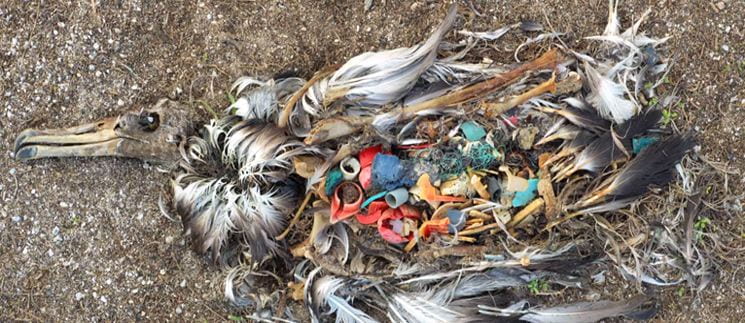“We’re being overwhelmed by our waste” is the daunting verdict on ocean plastic pollution by environmental engineer, Jenna Jambeck. Her statement is sustained by the recently discovered “plastic island”, an area covered in trash from around the world, as well as the existence of several garbage patches in the Pacific, including one larger than the country of Mexico. Despite these alarming statistics, very little has been done internationally to reduce the use of plastics or divert them from our waterways. This poses the question, if ocean plastic pollution is such a significant global issue, why is it not included as a development issue?

Chris Jordan’s documentary “Albatross” takes a look at how ocean plastic is killing birds in the Midway Atolls in the Pacific Ocean.
Tearfund, a charity involved in international development, is strongly encouraging governments worldwide to fund waste reduction and marine plastic pollution prevention. For example, Tearfund is demanding that the British government increase the waste management budget by 390 million euros. Proactive measures like these would not decrease the current amount of garbage in the sea, but they would reduce the amount of plastic materials entering the world’s waterways in the future.
An increased budget towards the decrease (and eventual elimination) of plastic and other waste products is necessary given current health and environmental issues. The Guardian examines a study that found ninety percent of the ocean pollution comes from just ten rivers, eight of which are in Asia and two in Africa. When waste is not properly disposed of in developing countries, more of it ends up in the river, which eventually leads to the sea. When waste is discarded in these areas, the methods used are doing more harm than good. For example, burning trash causes up to 270,000 deaths worldwide each year, according to Joanne Green of Tearfund. But, waste management is not a development issue confined solely to Global South countries.
In the Global North waste management is regarded as a desired public service that people are willing to pay for, unlike the Global South, where there is a limited budget and the legal framework focuses more on disposal instead of reusing and recycling. But, high-level consumerism has generated such large amounts of garbage in the United States that landfills are finding it difficult to keep up. For example, the Puente Hills Landfill in Los Angeles is as tall as some of the city’s skyscrapers, a geological feature of the landscape in an area that used to be a valley with a dairy farm. Sometimes the amount of trash is so great that developed countries can no longer find room to store their waste. Canada is guilty of shipping waste off to developing countries, such as a situation in Manila, Philippines where 50 large shipping containers filled with recyclables sat unclaimed for months until they started emitting a strong odour. In other words, plastic pollution is a universal international development issue. The article “Towards universal development” describes the author’s experiences in a community affected by water pollution from unsustainable mining practices, an issue predominant in Asian, African or Latin American countries. However, the community studied was in the United States, under 500 miles from the Washington D.C, the nation’s capital. The distinct division between Global South and Global North is not necessary for the improper disposal of waste and the effects of pollution, the problem is interconnected and requires a solution beyond the distinction of one nation.
Although not everyone lives near the ocean and cannot therefore see the issue for themselves, plastic pollution is an issue that eventually will impact everyone if serious action is not taken now. Money from international development organizations, as well as the lobbying they have been doing to governments for change are positive steps in the right direction. Proper garbage disposal, management and reduction requires the international community to work together to protect the environment for future generations. The oceans provide so much for humans, and it is time to give them the attention that they deserve for the betterment of our world.
For more information on what you can do to reduce your plastic usage check out “How to Lose Plastic in 10 Days”.
Lucinda Barrett is a first year Criminal Justice and Public Policy student who has a passion for marine life. She has participated in volunteering projects focusing on coral reef and shark conservation, most recently on the tiny island of Gili Air in Lombok, Indonesia. Taking IDEV1000 sparked her interest in international development studies, and she believes that a large part of future-proof development involves the protection of our oceans.

